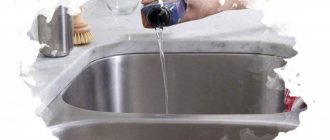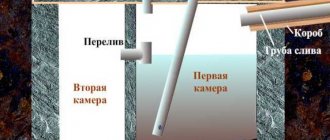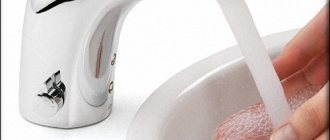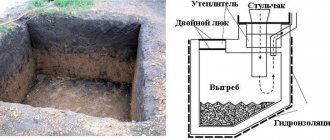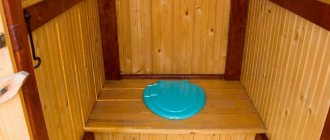The unpleasant smell of toilets and cesspools in the countryside forces the owners to collect latrines in one corner of four plots. Until recently, smell and flies were an inevitable evil of dacha life. With the advent of antiseptics for country toilets that decompose waste, the problem is quickly solved. The smell disappears, the waste liquefies, and its level drops.
Substances that disinfect and decompose waste are called antiseptics, bioactivators or bacteria for septic tanks.
Antiseptics for country toilets
What is a toilet antiseptic?
Most often, toilets of the classic type are made in the country - with a cesspool. To get rid of an unpleasant odor, you need to use a special substance called an antiseptic. This is a disinfectant chemical that breaks down impurities and eliminates unpleasant odors. Tablets or bioactivators are used as an antiseptic.
Assortment of antiseptics for cesspools
In addition, you can use natural products that perform the same functions as a chemical antiseptic. So, a homemade peat mixture is added to the cesspool, which helps turn waste into compost. Of course, this option is the cheapest. But it must be taken into account that the process of compost formation is very long, and peat must be constantly added so that the reaction proceeds faster.
Chemical antiseptic also has its disadvantages. So, it is very dangerous for humans, because upon contact with the skin it can corrode it. In addition, it pollutes the environment. Therefore, before using it in the country, you need to think carefully.
Dry toilets outside
Dry toilets are a special type of latrine that does not use water. Many summer residents choose them because they are very easy to care for. Such devices are used both indoors and outdoors.
Main varieties:
Composting toilets. In them, waste is completely converted into compost, which practical gardeners use on the site as fertilizer.- Dry toilets with separate urine collection. They separate feces from urine into different containers.
- Dry toilets with chemical filler. They are small in size and suitable for short-term use.
- Toilets with different types of waste disposal: incineration, packaging and freezing. These devices are practical to use, but have a high cost, which can exceed 50,000 rubles.
The main advantage of all dry toilets is the absence of odor.
Why are antiseptics needed?
An antiseptic for the toilet is very important, so it is necessary to use it. After all, he:
Drain cleaning liquid
- Cleans the waste tank from impurities entering it;
- Prevents limescale from forming on the walls of the toilet;
- Has a disinfecting effect;
- Eliminates unpleasant odors from the toilet;
- Dissolves solid waste, including even toilet paper;
- The tank is kept clean at all times;
- If a chemical antiseptic freezes, it does not lose its properties after dissolution;
- Increases the service life of the toilet;
- Prevents corrosion.
The only disadvantage of the drug is that it must be used with a certain frequency. Otherwise, its use will not give the desired result.
Caring for rural sewerage
Bioactivators
Bioactivator for cesspools
This version of an antiseptic for a toilet is best suited for installation in a country house, since the breakdown of waste occurs without harm to the surrounding area. But fruits and vegetables are grown at the dacha, so they cannot be allowed to become contaminated. However, for the normal functioning of bacteria, special conditions are necessary: moisture, light, temperature. With the help of such microorganisms, you can quickly get rid of sewage, prevent the development of fungi and eliminate unpleasant odors. In addition, moisture is absorbed into the soil, so the contents of the hole become smaller and smaller. You can purchase a biological antiseptic in the form of tablets, powder or liquid. For a small toilet, you can use just one tablet. But if it is large and the whole family uses it, then it is better to add powder or liquid.
It must be taken into account that biobacteria are inactive in tablets and powders. Therefore, you need to activate them yourself. To do this, they are mixed with cold water and left for a certain time. Immediately after the liquid enters the cesspool, the cleaning process will begin. Bacteria feed on sewage and multiply. Therefore, over time, waste breakdown will occur even faster.
Smell in the country toilet: the main reason
To successfully solve the question that worries many summer residents, how to get rid of the smell in an outdoor toilet, you first need to understand why it occurs. Only eliminating the root cause will help solve the problem, while regular wet cleaning of the premises and the use of air fresheners in this case will not save you from the stench.
The design of a country toilet is simple: it is a small cabin (the material can be wood, brick, metal, slate, etc.), inside of which there is a hole (on which a toilet seat can be installed). Under the cabin there is a cesspool for feces. It is this that is the main source of the unpleasant odor. Feces, when decomposing, release biogas (60% methane), hydrogen sulfide, ammonia, etc. But the smell is not the worst thing. The danger of biomethane is that its inhalation can lead to loss of consciousness, and in high concentrations, even death.
Methane can penetrate wood and destroy it, which can lead to the collapse of the structure under the weight of a person
How to use it?
Application of a bioactivator
Since bioactivators are living organisms, in order for them to function normally, it is necessary to follow certain rules:
- Under no circumstances should chemicals and medications that can kill bacteria get into the cesspool;
- The water level in the pit should be approximately 20 cm above the solid elements;
- Be sure to provide ventilation for the toilet, since bacteria also need fresh air;
- Bacteria are killed by exposure to cold. Therefore, it is not recommended to use them in winter, early spring or late autumn;
- If you do not add enough bacteria to the pit, they will not be able to cope with all the waste, so they will die over time.
How to arrange ventilation
To prevent the appearance of an unpleasant odor, it is recommended to provide an exhaust hood even during the construction of the toilet. If it is not there, you should put a pipe in the cesspool box. After which she should be taken outside. This can be done through the roof. It is important to ensure that the outermost part is located 2.5-3 meters from the ground surface. The insertion area should be covered with sealant, and the pipe fragment above the roof should be painted black. When exposed to heat, the pipe will begin to heat up. Thanks to this, it will act as a hood.
The pit should reach a depth of 2 meters. It is recommended to make it from waterproof material. It is also permissible to organize natural ventilation in the toilet. To do this, it is recommended to make a hole near the floor or a window.
Source
Chemical cleaning
Currently, there are three types of substances intended for chemical treatment of sewage:
Formaldehyde for cesspools
- The cheapest type is formaldehyde. However, several years ago it was proven to be very toxic to humans. Therefore, it is practically not found on the open market;
- Nitrogen purifiers also do a good job, but they are very expensive. But they are insensitive to detergents and cleaning substances that may be in the cesspool;
- One of the best chemicals for cleaning toilets in the country is ammonium. The preparations that contain it quickly break down waste and eliminate unpleasant odors. However, it is unknown how the substance affects the environment, so you need to work with it carefully.
How to choose a product for a cesspool
When choosing bioactivators, Vyborexperta.ru experts first of all recommend focusing on their purpose, type and type.
Purpose
Regular use of such products allows you to clean the pit for collecting human waste much less frequently and eliminates the risk of an unpleasant odor. When using the drug, the sewage is separated into 2 layers. Silty sediment accumulates at the bottom, and water at the top. If the structure is open, without a bottom, then it is simply absorbed into the ground, and if there is a base, it can be pumped out with an appropriate pump.
The best dry toilets according to user reviews
Type
Cesspool products are divided into two large categories - chemical and biological. In the first case, artificial components are added to the composition: formaldehyde, ammonium compounds, nitrate oxidizers, bleach. Naturally, they are cheaper than their counterparts, but also less safe. Biological products are made with the addition of natural microorganisms that break down human waste and neutralize unpleasant odors. These bacteria consume the contents of the structure and process it into a harmless liquid.
View
Cesspool cleaning products are available in liquid form, powder, granules, and tablets. The former, as a rule, are a concentrate that must be diluted with water before use. This reduces the consumption of the drug, but it also costs more than alternative options.
The powder form also often requires dilution with liquid to activate the microflora. It supports the functioning of autonomous sewage systems by accelerating the growth of microorganisms and allows you to accurately calculate the effective dosage.
The most convenient to use are tablets, which may need to be pre-dissolved in water. Most often, they can be used in both anoxic and aerobic conditions. Usually one piece is enough to remove unpleasant odors and absorb impurities.
Using an antiseptic for a dry closet
An antiseptic is also needed for a dry closet, since it must be periodically cleaned of microorganisms. Thanks to the use of special compounds, toilet parts become stronger, as their anti-corrosion properties increase. In addition, the antiseptic perfectly disinfects the dry closet and eliminates unpleasant odors. You don’t have to worry about clogging the toilet, since the substance quickly breaks down not only human waste products, but also toilet paper.
Products for dry toilets
But it is necessary to take into account that to clean the dry closet you need to use only liquids specially designed for this purpose. It is not recommended to replace them with dishwashing detergents, clothing powder and other substances. This may cause the toilet to break down.
Liquids intended for cleaning biological toilets can be of two types:
- For upper tanks. They wash away waste directly. They need to be poured into the top tank. If they fall into the lower tank during flushing, they do not prevent the decomposition of waste;
- Liquids for the lower tank should be more active from a chemical and biological point of view. After all, they are designed to dissolve or recycle waste. In addition, they are important for eliminating unpleasant odors coming from sewage. For dry toilets, only biological antiseptics can be used. Therefore, when purchasing a drug, you need to carefully read its composition.
Special cases
Let's look at how to get rid of some characteristic odors that are unpleasant for the person himself and his environment.
Tobacco
The best way to get rid of tobacco smell on clothes is to smoke only outside the apartment, otherwise the smoke will gradually permeate all things. The following remedies will help free things from the spirit of tobacco.
Vacuum cleaner
The smell of tobacco accumulates on dust in clothes. Things are knocked out, covered with a damp cloth and vacuumed at high power.
Tip: It is useful to keep clothes near steam - hang things near a hot shower, over a basin of hot water, then dry them. The smell of tobacco also quickly disappears in the cold.
Coffee
The coffee beans are ground and placed in a fabric bag. The smelly items are loosely placed in plastic bags for several hours, with coffee sachets placed between them. Outerwear is dried near the radiator, on which a bowl of ground coffee is placed.
Citrus peels
The peels, packed in fabric bags, are placed directly with the items in the drum. The same bags are placed in clothing closets so that the smell of freshness permeates the clothes.
New things
If airing does not get rid of the smell of dyes or synthetic fabrics from new things, ammonia will help. Take 1-2 tablespoons of ammonia per liter of cold water and soak the new item for an hour, then wash it in the recommended mode.
Pets
Special sprays help get rid of the smell of cats, dogs, birds and other pets on clothes. A home remedy is to soak the item in a vinegar solution (2 tablespoons per liter of water).
Rotten aroma
The smell of rotten meat can be easily removed using citrus fruits. Squeeze lemon juice (dissolve citric acid) and add to water when washing, soaking or rinsing. Let us remind you that the product has a whitening effect.
Sweat
The smell of sweat ingrained into clothes sometimes remains even after washing in an automatic machine. Often the item cannot be washed, and the sweaty smell needs to be gotten rid of.
Oxygen stain removers
Oxygen bleaches dissolve all contaminants in fabrics, so they can also eliminate odors. Use only on items that can be bleached.
Laundry soap
72% laundry soap kills most bacteria and helps get rid of fatty particles. Rub soap onto dirty areas, leave for 5-10 minutes, wash the item and rinse well.
Dish soap or hair shampoo
Sweat contains fatty particles, so dishwashing detergents and shampoo dissolve them well. Contaminated areas are moistened, left for an hour, then washed.
Cold environment
If you don’t have time to tinker with clothes, you can take things out into the extreme cold or place them in the freezer for several hours. The smell of sweat will die along with the bacteria.
Vinegar essence
The essence is diluted to a concentration of 6-9% (table vinegar). Place it in a spray bottle and spray individual areas or the entire item. Allow to dry well and ventilate.
Fish
To remove fishy smell, soak clothes in solutions:
- laundry soap;
- vinegar;
- light - in bleach;
- shampoo, dish soap.
After washing, items are rinsed in cold water.
Traces of gasoline or diesel fuel are first removed with a stain remover. Then they fight the smell by soaking the clothes in a solution of ammonia, soda, lemon juice, laundry soap or hydrogen peroxide.
Antiseptic for wooden toilet
An antiseptic can be used not only to break down sewage, but also to treat the toilet itself. Since outdoor toilets in the country are made of wood, the disinfectant must be designed specifically for such material.
inkstone
Wood needs to be treated from time to time to reduce the likelihood of microorganisms developing. You can use both biological and chemical antiseptics for this. Or you can cook it yourself. To do this, you need to take a 25-liter container, preferably with a lid (a canister of the appropriate volume is ideal). It contains 100 g of iron sulfate (costs about 70 rubles) and 10 g of potassium permanganate (50 rubles). Everything is poured with 20 liters of water and left until completely dissolved. It can then be applied to the wooden part of the toilet. The price of such a product is approximately 160 rubles, but it has a lot of benefits. In addition, this composition is also suitable for treating dry toilets.
Thus, you can purchase a ready-made antiseptic. You need to select it according to your needs, since each type has its own pros and cons. In addition, you can make the drug at home with your own hands.






